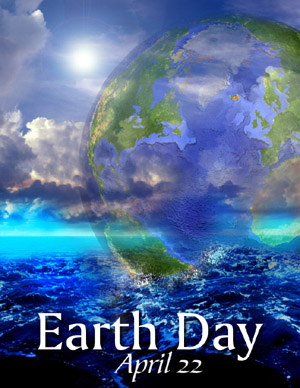NOAA Earth Day
NOAA's Environmental Heroes
Preserving the Planet in Many Ways
April 22, 2008 — A harbormaster who keeps close watch on fish populations during annual dredging operations, a school teacher who organizes science fairs in his free time, and an engineer who developed an online virtual community to support NOAA’s Citizen Weather Observer Program. These are just a few of the 2008 NOAA Environmental Heroes award recipients.
One of the many ways NOAA celebrates Earth Day is by recognizing private individuals and organizations that volunteer their time to help NOAA carry out its mission. “There are thousands of volunteers who give their time to help NOAA do its work, and the NOAA Environmental Hero Award is our way of saying ‘thank you’ to some individuals and organizations each year,” said retired Navy Vice Admiral Conrad Lautenbacher, Ph.D., undersecretary of commerce for oceans and atmosphere and NOAA administrator. “Each year, I am impressed by the efforts of the Environmental Heroes, who serve as inspirations to us all. On behalf of the men and woman working for NOAA, I congratulate the 2008 winners.”
Since 1995, NOAA has recognized more than a hundred individuals and organizations for their outstanding contributions to NOAA. In 2007, a Long-Time Achievement Award also was established to periodically honor long-time NOAA-related achievement.
Long-Time Achievement Award
Robert Simpson, Washington, DC
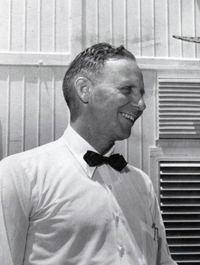 Simpson is being honored with NOAA’s Long-Time Achievement Award this year for his longtime commitment to NOAA's mission. In 1948, Simpson founded a small weather observatory on top of Mauna Loa Volcano, Hawaii, that evolved into the world famous Mauna Loa Observatory. This station is an integral part of NOAA’s Global Earth Observation System of Systems (GEOSS). It also housed the original Keeling carbon dioxide measuring instruments, which proved that the atmosphere’s carbon dioxide levels were rising. A decade later, Simpson conducted ground-breaking hurricane research, and in 1967 was appointed the first director of NOAA's National Hurricane Center’s (Miami, Fla.). Simpson is also co-developer of the Saffir-Simpson Hurricane Scale used to rank hurricane intensity. Simpson continued active research and administration for many years and now lives in retirement with his wife Joanne at the age of 95. [more] Simpson is being honored with NOAA’s Long-Time Achievement Award this year for his longtime commitment to NOAA's mission. In 1948, Simpson founded a small weather observatory on top of Mauna Loa Volcano, Hawaii, that evolved into the world famous Mauna Loa Observatory. This station is an integral part of NOAA’s Global Earth Observation System of Systems (GEOSS). It also housed the original Keeling carbon dioxide measuring instruments, which proved that the atmosphere’s carbon dioxide levels were rising. A decade later, Simpson conducted ground-breaking hurricane research, and in 1967 was appointed the first director of NOAA's National Hurricane Center’s (Miami, Fla.). Simpson is also co-developer of the Saffir-Simpson Hurricane Scale used to rank hurricane intensity. Simpson continued active research and administration for many years and now lives in retirement with his wife Joanne at the age of 95. [more]
|
NOAA's 2008 Environmental Heroes |
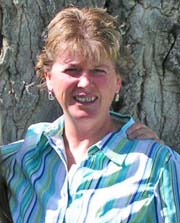 Beth Anderson, Wendover, Utah Beth Anderson, Wendover, Utah
Continuing work begun by her father in 1993, Anderson has collected more than 600 air samples at her remote western Ranch in Callao, Utah, over the last 13 years. Her efforts have assisted NOAA’s Earth System Research Laboratory’s Global Monitoring Division produce a 15-year time series of carbon dioxide, methane, and other trace gas measurements at this location. The data are used by scientists to study the carbon cycle and global climate change. Anderson is a fifth generation rancher at her family's historic Bagley ranch, where she helps run one of the last privately owned historic Pony Express Stations. [more] |
 Tom Barry, South Ponte Verda Beach, Fla. Tom Barry, South Ponte Verda Beach, Fla.
A retired Navy Officer, Barry has volunteered more than 1,200 hours at NOAA's Guana Tolomato Matanzas National Estuarine Research Reserve's education center in Ponte Vedra Beach, Fla., since April 2005. By supporting NOAA’s research, outreach/education, and stewardship efforts, Barry has helped NOAA's National Estuarine Research Reserve System protect more than one million acres of estuarine land and water. Estuaries provide essential habitat for wildlife; offer educational opportunities for students, teachers and the public; and serve as living laboratories for scientists. [more] |
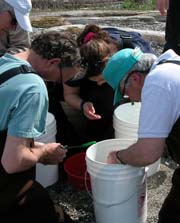 Bob Buck & Jim Somers, Coupeville, Wash. Bob Buck & Jim Somers, Coupeville, Wash.
Buck and Somers have sampled the pocket estuaries in the Whidbey Basin of Washington State's Puget Sound since 2002. Their efforts have helped NOAA understand fish ecology in large ecosystems and how best to protect and restore these valuable resources. Buck and Somers are active members of the Washington State University/Island County beach Watchers, retirees, and long-time Whidbey Island residents. [more] |
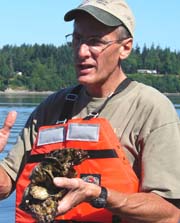 Bill Dewey, Shelton, Wash. Bill Dewey, Shelton, Wash.
Dewey has volunteered thousands of hours over the last 20 years to help develop and implement public policy for water quality protection and marine resource issues. His efforts support NOAA and have reinforced the important contribution aquaculture makes to our nation’s seafood supply, the restoration of important marine species, and protecting our nation’s water quality. Over the last 27 years, Dewey has owned and operated his own clam farm in Samish Bay, Wash. He now manages public affairs for the Taylor Shellfish Company in Shelton, Wash. [more] |
 Philip Gladstone, Carlisle, Mass. Philip Gladstone, Carlisle, Mass.
Gladstone created an online virtual community (i.e., suite of tools and feedback resources) for NOAA’s Citizen Weather Observer Program, which enabled 5,000 volunteer weather observers to more easily contribute high quality automated weather reports to NOAA in near real time. CWOP observations are used in NOAA's National Weather Service operations to improve winter storm warnings, fire weather warnings, flash flood warnings, and land-falling hurricane warnings in addition to public weather forecasts. Gladstone is a engineer currently working on computer security at Cisco Systems in Boxboro, Mass. [more] |
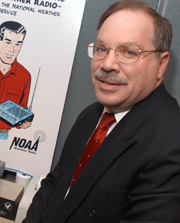 Daniel Gropper, Vienna, Va. Daniel Gropper, Vienna, Va.
For 20 years, Gropper has assisted NOAA’s National Weather Service in meeting it’s most vital mission — protecting lives and property. He has lent his engineering, legal, and bureaucratic expertise over countless volunteer hours to support NOAA's National Weather Service with warning broadcasts and Skywarn, a volunteer weather spotter program. He even developed a NOAA Weather Radio All Hazards receiver that is used in many schools, public buildings, and government agencies. Gropper is a ham radio operator, engineer, patent attorney, and an inventor with a passion for the weather and public service. [more] |
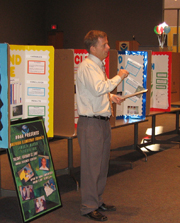 Steven King, Teacher, Washing- Steven King, Teacher, Washing-
ton, DC
King is a dedicated and devoted elementary school teacher in Washington, D.C. He is a strong supporter of NOAA-related science education. For the past five years, King led the James D. Martin (formerly the Shepherd Elementary School) Science Fair in Silver Spring, Md. King's efforts support NOAA’s education programs and activities, as well as the agency's cross-cutting priority of promoting environmental literacy. [more] |
 David A. Robinson, Piscataway, N.J. David A. Robinson, Piscataway, N.J.
Robinson is a scientific leader and visionary supporting NOAA’s national climate services and its contributions to the Intergovernmental Panel on Climate Change. He is a passionate supporter of NOAA’s efforts to engage climate science and bring communities together to help the nation understand and adapt to climate change. Robinson is the chairman of the Department of Geography at Rutgers University and a State Climatologist in Piscataway, New Jersey. [more] |
 Brian Swedberg, Petaluma, Calif. Brian Swedberg, Petaluma, Calif.
Over the past few years, Swedberg has monitored fish populations during the annual hydraulic dredging of the Port Sonoma Marina in Petaluma, Calif. His efforts have helped NOAA in addressing the potential effects of dredging activities on salmon. As harbormaster of this marina, Swedberg has consistently demonstrated an eagerness to try new approaches to protect living marine resources in association with marina operations and maintenance. [more] |
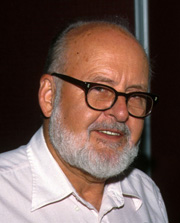 Richard Zingula, Houston, Texas Richard Zingula, Houston, Texas
Zingula has dedicated 40-plus years of advocacy, exploration, and volunteering for NOAA’s Flower Garden Banks National Marine Sanctuary in the Gulf of Mexico. A leader in the Houston Underwater Club, Zingula led the charge to have the Flower Garden Banks designated as a National Marine Sanctuary. He also is a favorite of participants in the Sanctuary's Down Under, Out Yonder and other professional development workshops for educators. Now retired, Zingula served as a geologist /paleontologist wih an Oil Company in Houston, Texas. [more] |
